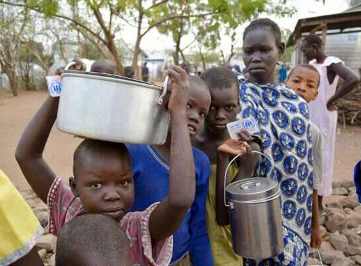800 new South Sudanese refugees arrive in Abyei: OCHA
August 9, 2015 (KHARTOUM) – The United Nations Office for the Coordination of Humanitarian Affairs (OCHA) said that 800 new South Sudanese refugees have arrived in the disputed region of Abyei.

“Inter-communal clashes and cattle raids since the signing of the Peace Agreement two months ago between the Dinka Apuk and Dinka Aguok have increased tensions in Warrap State, triggering the ongoing population movement,” the bulletin reads.
OCHA stressed the mission findings indicate that approximately 800 displaced people have arrived in Abyei since 11 June 2015, with more arrivals likely in the coming weeks, noting the majority of people displaced are women and children, with only a few elderly people and men.
“While the movement to Abyei is intended to be temporary, the people reported they will not return back during the rainy season, which will likely continue until November,” it said.
According to the bulletin, local authorities have been unable to provide any food, so displaced people have relied mainly on foraging fruits and edible leaves in the area, also the area has not been cleared by demining operations, making foraging in the area potentially risky.
It pointed out that most people are staying outside under trees where they are exposed to harsh rainy season conditions, saying there is only one water source available for both the host community and the displaced people, and long queues have already led to some conflict.
“Since there are no latrines in the area, the people have been practicing open defecation. The main health issues are malaria and diarrhoea, which are of increased concern due to the high number of small children among the displaced and below-standard living and sanitation conditions,” it added.
The UN agency mentioned existence of a health clinic nearby, although it only has a very limited stock of medicine, saying the urgent needs of the displaced people include temporary shelters, emergency household supplies, mosquito nets, water, food and health services.
It expected that plans to relocate the people will be finalised this week, saying Local authorities are exploring an alternative hosting area in the Magar internally displaced persons (IDP) site, located some 2 km away from Nyiel village.
According to OCHA, the local church Caritas and the host community have provided some initial support, including 4 bags of sorghum, 80 buckets, 120 jerry cans, 65 blankets and 15 sleeping mats, however more support is needed.
DIRE HUMANITARIAN SITUATION IN JEBEL MARRA
Meanwhile, OCHA quoted the government’s Humanitarian Aid Commission (HAC) and local authorities in Central Darfur as saying that the humanitarian situation of displaced people in North Jebel Marra’s Fanga Suk, Abunga and Niscam villages as well as in Rokoro town is dire.
The agency pointed that the locality commissioner said that an estimated 38,000 people displaced in these areas are in need of emergency shelter and household supplies, water, sanitation as well as health and education services.
According to HAC, these people fled their homes between February and May 2015 following clashes between government forces and an armed group, and have yet to receive any humanitarian assistance.
OCHA pointed to lack of functioning health facilities in these areas of displacement, saying the displaced people have to seek health services in El Fasher and Tawila towns, which are approximately 60km away.
“The recent polio vaccination campaign in the area was unable to reach children in these areas due to access constraints. Almost all hand pumps in the locality are no longer functioning and people are forced to collect water from unsafe water sources such as the wadi (seasonal river bed) and springs. Furthermore, there are no latrines in the areas of displacement,” the bulletin reads.
According to OCHA, HAC plans to provide health, education, livelihood as well as emergency shelter and household distributions to affected populations in the locality from Fanga Suk village.
It pointed out that aid groups have not had a presence in the North Jebel Marra area since 2006 due to access restrictions following fighting between government forces and an armed group in the area.
“The last time any humanitarian organisation was in the locality was in May 2015, when the Sudanese Red Crescent Society (SRCS) distributed clothing, sugar and flour to 800 vulnerable people in Fanga Suk village,” added OCHA
(ST)
